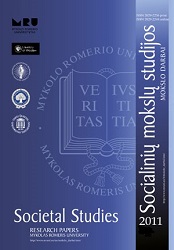Tautinėms mažumoms priklausančių asmenų vardų ir pavardžių vartojimas: tarptautinė ir Lietuvos Respublikos praktika
The Right to Use First Names and Surnames in Minority Languages: International Practice and the Practice of the Republic of Lithuania
Author(s): Aistė RačkauskaitėSubject(s): International Law, Human Rights and Humanitarian Law, Sociolinguistics, Ethnic Minorities Studies, Sociology of Law
Published by: Mykolas Romeris University
Keywords: persons belonging to national minorities; linguistic rights; International Covenant on Civil and Political Rights; European Convention for the Protection of Human Rights and Fundamental Freedoms;
Summary/Abstract: The aim of this article is, firstly, to analyse the scope of the right to use first names and surnames in minority languages under the regulation of international law and, secondly, to discuss the interaction between international and national law concerning this right. The Covenant on Civil and Political Rights (the Covenant) ensures the protection of civil and political rights. While the Universal Declaration of Human Rights does not contain any provision regarding the rights of minorities, the Covenant grants them equality with the majority and the right to use their own language. The Covenant remains the only legally binding instrument of global application that directly sets forth minority rights. Article 27 of the Covenant stipulates that ‘in those States in which ethnic, religious or linguistic minorities exist, persons belonging to such minorities shall not be denied the right, in community with the other members of their group, to enjoy their own culture, to profess and practice their own religion, or to use their own language’. Article 27 of the Covenant ensures the right of individuals belonging to a linguistic minority to use their language among themselves, in private or in public. It should be noted that it is a right distinct from other language rights protected under the Covenant. It is worth mentioning that the right to use first names and surnames in minority languages arises from the protection of private and family life (the interpretation of Article 17 of the Covenant and Article 8 of the European Convention for the Protection of Human Rights and Fundamental Freedoms). Therefore, the main difficulty is the interaction between private and family life and state regulation of persons’ names and surnames. The Framework Convention for the Protection of National Minorities ensures that every person belonging to a national minority has the right to use his or her surname (patronym) and the first name in the minority language and the right to official recognition of them, according to modalities provided for in their legal system (Article 11(1). The national legislation in Lithuania recognizes the transcription of names and surnames into Lithuanian.
Journal: Socialinių mokslų studijos
- Issue Year: 3/2011
- Issue No: 1
- Page Range: 365-384
- Page Count: 20
- Language: Lithuanian

